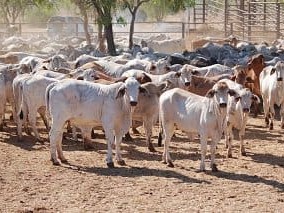 A lawyer pursuing legal action against the Federal Government on behalf of northern cattle industry businesses affected by last year’s live export ban is hoping for a resolution within the next few months.
A lawyer pursuing legal action against the Federal Government on behalf of northern cattle industry businesses affected by last year’s live export ban is hoping for a resolution within the next few months.
The two month shutdown of the trade during its peak annual period had a significant financial impact on hundreds of northern producers, transporters, stock agents, feed companies, exporters and the many small businesses that service the industry.
However Brisbane-based lawyer Trent Thorne from large-scale Queensland law firm McCullough Robertson says a series of internal Federal Government documents obtained through Freedom of Information searches shows that the minster’s decision to ban the trade was not supported by departmental advice.
In particular he says the documents show that federal agriculture minister Joe Ludwig had a framework in place that he could have used to address animal welfare concerns at the time ABC Four Corners aired “A Bloody Business” on May 30 last year, without needing to suspend the trade.
The framework was in the form of the live export industry’s strategic vision document, which included supply chain assurance models, presented to the department by the Australian Live Exporters Council and Livecorp in May 2011 prior to the Four Corners program.
The document formed the basis of the Exporter Supply Chain Assurance system (ESCAS) implemented by the minister when trade resumed in August 2011.
Mr Thorne said DAFF’s internal file notes to the minister in response to the strategic vision document indicated the department wanted the industry to adopt faster time frames and provide more detail, but overall its comments were positive and urged the Government to work collaboratively with the industry to develop the framework.
An internal memo provided to the minister on May 30 by DAFF stated the minister should agree to revisit the question of regulation “if (and) when the voluntary efforts from industry fail to deliver improvements in animal welfare conditions”. It said further: "On balance the department considers that the best approach is for government at this stage to continue to work collaboratively with industry to encourage them to voluntarily improve their efforts to improve animal welfare."
“The minister had this advice to hand when he made his decision (to ban the trade on June 7),” Mr Thorne said. “Why wasn’t the industry given a month to get its house in order and to get this system in place with the threat of a suspension hanging over its head?”
Another key file among the several accessed through FOI searches is a minute dated June 6 2011 which advised the minister that imposing a sudden ban would pose a threat to the welfare of tens of thousands of cattle in the north. The advice was supplied to the minister by DAFF after he requested advice on “likely animal welfare consequences associated with prohibiting the export of live feeder cattle to Indonesia”.
It warned of serious animal welfare issues and flow-on economic consequences for all cattle producers if a ban was implemented.
“Producers do not have the feed reserves to hold all these animals for the remainder of the dry season without creating a serious on-farm problem,” the advice stated.
“All turn-off options involve long journeys… such times are associated with serious potential risks. If animals are only able to transported after they have started to lose weight then the risks are far higher for them, as has been seen during periods of drought.”
It further stated: “Compounding problems include continuing provision of feed and water to animals that cannot be moved off farm during the dry season, loss of income and cash flow issues for producers and its impact in regional north Australia, including any adverse impact on planned investments in the region.”
Minister Ludwig made the decision to ban live exports to Indonesia the following day.
 Mr Thorne believes the evidence shows that the minority Gillard Government panicked in the face of “a runaway, emotive debate” and made a decision not on animal welfare grounds but on political grounds. He said the time-frames involved show the Government did not allow adequate time to appropriately assess and consider the economic impacts of a ban.
Mr Thorne believes the evidence shows that the minority Gillard Government panicked in the face of “a runaway, emotive debate” and made a decision not on animal welfare grounds but on political grounds. He said the time-frames involved show the Government did not allow adequate time to appropriately assess and consider the economic impacts of a ban.
“The order that was made on June 7 was so unreasonable, we say, that no reasonable person would exercise that power,” Mr Thorne said.
“Anyone who had a modicum of an idea of the economic ramifications could not have made this decision.”
‘Defective administration’
The McCullough Robertson action is based on a little-known clause that centres around the legal concept of “defective administration”. The “Federal Scheme for Compensation for Detriment Caused by Defective Administration” provides funds for persons who have suffered detriment as a result of a commonwealth agency's "defective" actions. The scheme can be applied if a minister has caused the detriment as a result of "defective administration".
It is one of two separate legal actions underway on behalf of clients affected by last year’s ban, with Minter Ellison also leading a simillar but unconnected legal action which is said to involve about 20 affected parties.
A spokesman for the firm told Beef Central yesterday that it is not commenting publicly on the action.
Neither action has progressed to court, with both parties understood to be hoping for a negotiated outcome that will result in compensation payments to affected businesses without the need for litigation.
The existence of both actions was brought to light when the Federal Government made reference to “unquantifiable contingent legal liabilities” in this year’s federal budget papers in May. A note in the papers acknowledged that Minister Ludwig’s decision could make the Government liable for compensation as a result of the two legal actions.
Minister Ludwig has declined to comment on the matter but has defended his decision to suspend the trade in recent statements to media. He told ABC radio earlier this month that he made the decision after considering a range of advice from his department, and said that the only way to implement a supply chain assurance system was to have a short suspension. “All of that was surprisingly done in a very short space of time. I asked the Department to do it as quickly as possible. The Department and industry both worked very long hours over a very short period of time to achieve the supply chain assurance that we now have in place.”
He added that the new system allowed the industry to continue while keeping animal welfare outcomes. “We had to make sure that we could put in place a supply chain that would hold exporters accountable, and also give, ah, when you look at the producers, the producers had no line of sight as well. The producers now have a line of sight from where their cattle go into their export markets and what happens to their cattle at the end.”
The Government has been assessing both legal actions since early 2012. Mr Thorne told Beef Central this week that there was no indication of when an outcome was likely, but, given the degree of economic difficulty many northern businesses were facing, it was hoped that a resolution would be achieved soon.
He declined to say how many clients he was representing, but said the number was significant with more affected parties joining the action every day.
‘Self-regulation’ claim challenged
The Brisbane based lawyer and former NT jackaroo, who has a direct connection to the industry via his brother Nick, the owner of the Cedar Park export yards south of Darwin, also challenges the commonly stated view that the industry was “self-regulated” in animal welfare terms prior to the ban.
Producers and exporters had no regulatory authority within Indonesia, he said, adding that the Australian Government’s own position statement on live exports said the responsibility of exporters finished at the point of disembarkation. “After disembarkation, the health and welfare of the livestock is the responsibility of the importer, under the authority of the importing country,” it states.
While the Four Corners report had effectively placed producers and exporters in Indonesian abattoirs, in reality they had no line of sight to what was happening at that point in the supply chain, he said.
He said the Government had effectively told producers and exporters they did not have responsibility beyond the point of disembarkation, yet after Four Corners the Government held them retrospectively responsible and banned the trade, causing them significant economic losses.
“The producers and exporters met every regulation that was required of them in getting the cattle to the importing country – there is no room for self-regulation on their part. People are trying to link the exporter with the abattoir when there was no link, and this is something that is fundamentally overlooked in this debate,” Mr Thorne said.



HAVE YOUR SAY